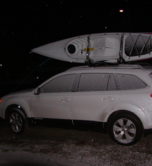Thirty trillion occupants
Bill Bryson is a marvelous writer. And a blazingly curious thinker. The Body: A Guide for Occupants, has kept me from sleep on more than one evening. Here's one of his nuggets: It seems that the human body contains about 30,000,000,000,000 living cells. That sounded like a lot to me so I tried counting to check his math. I could only get up to about 250 when I lost track and had to start again, so I'll trust his research.
Though there are misfires and miscommunication from time to time, and a continuous, mind-boggling turnover of personnel every second, these thirty trillion cells, this community, work through what I like to call a declaration of interdependence. Liberal cells don't hate conservative cells. Red blood cells and white blood cells may or may not be fond of each other and go to soccer games together, but when it comes to survival, it's we, not them.
Affiliation
And this is a forced affiliation, btw. As far as I know, cells don't get to say, "I'd rather be part of that body down the street." or "I'm not comfortable in a Swedish liver; could I please emigrate to a liver from Sri Lanka?" When we choose an affiliation, e.g. a spouse (for most of us, anyhow), we may have a difference sense of attachment, but the need for interdependence is no less. By the way, affiliate comes from a Latin word meaning, 'adopted as a child (literally, boy).' We work together better when we connect as if we were family. Functional Family.
Breakdown and the pathogen
The homeostasis of our bodily systems faces lots of challenges. Everything from too much pizza to infection upsets the community. One of the most insidious of these upsets is when our immune system's ID process goes haywire - autoimmune diseases like rheumatoid arthritis. And lupus. The sentinels of our body that attack invaders instead attack other members of the community. Instead of affiliation, we experience a civil war.
The jury is out on the cause of autoimmune disease. There seems to be a collision of genetic and environmental factors that triggers this implosion of community. So far, no one has isolated a pathogen - a virus, bacteria or protozoan, for instance - that causes it. We do know, with certainty, what causes the social version.
The pathogen that causes socioautoimmune disease is the sum of all of us who turn away. Away from possibility. Away from empathy. Away from the human family. We infect the community of humanity when we abandon the inoculations of common sense, compassion, and courage. When we would rather run from the resource of our differences and substitute "Them" for "Us."
The antidote to inflammation
When I feel the Shingles-like itch of resentment cropping up, I get to ask myself a question: "Who am I choosing to become that I fan my fear by pointing it at other people?"
It takes courage to face our fears. We can take that tiny bit of emotional inflammation upon ourselves. We can treat it with acceptance and compassion. We then carry the antidote: forgiveness. It must take root within us first, then be shared with every cell, every person. Resentment inflames, forgiveness heals.
I was given a gift recently by a close friend, a few words of realism: "Whatever I refuse to change, I choose." There's no injection for socioautoimmune disease, no pill. Just will.
Please stop by and give the back2different podcast a listen. It's totally pro bono and carried on Buzzsprout, Apple Podcasts, Spotify, Google Podcasts, Amazon Music, Stitcher, Pandora, Podcast Addict, Podchaser, Pocket Casts, Deezer, Listen Notes, and Podcast Index.
One more pitch, also a pro bono enterprise, is our book, Humanity@Work. It features voices from around the world in conversation about improving this thing we call Work. Any proceeds go to Doctors Without Borders. Both of these projects focus on bridging our differences and turning down the oven of inflammation.



